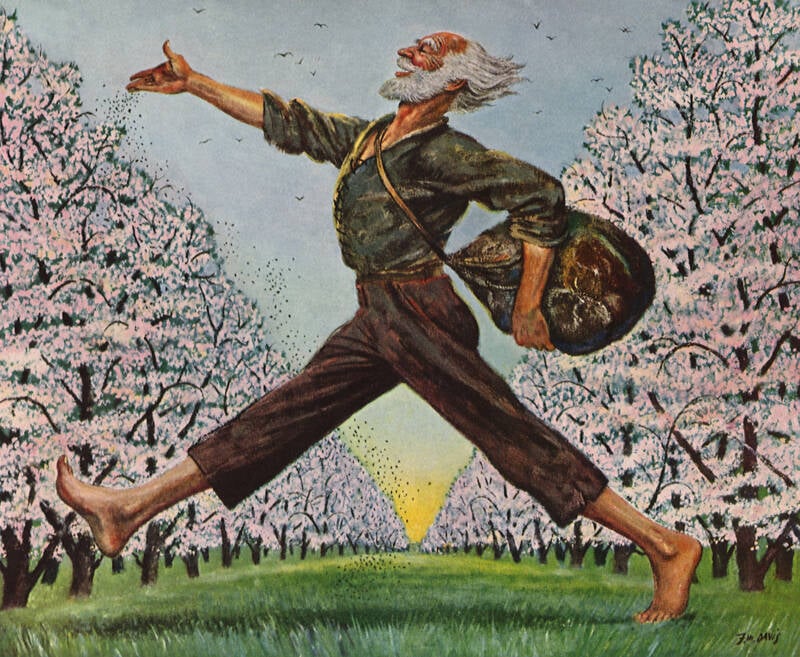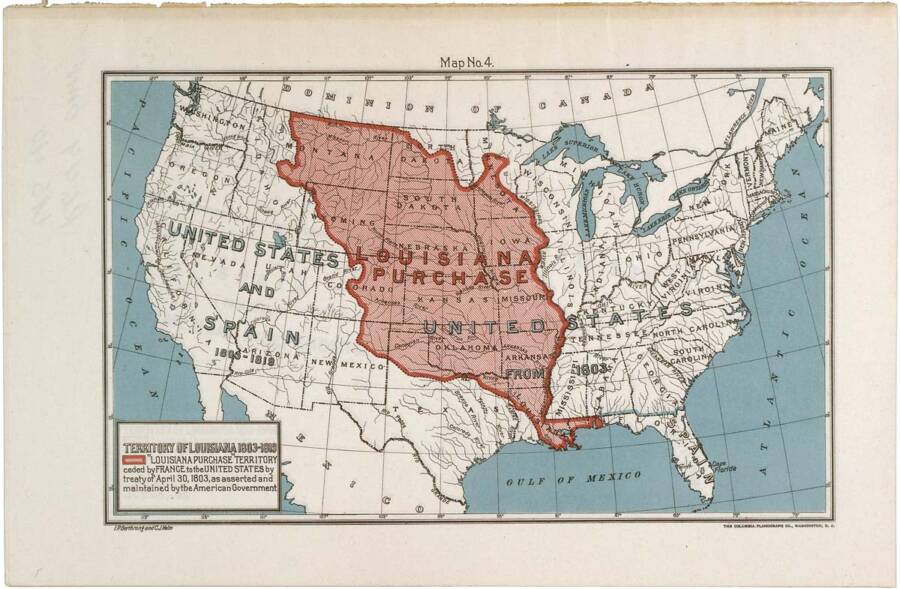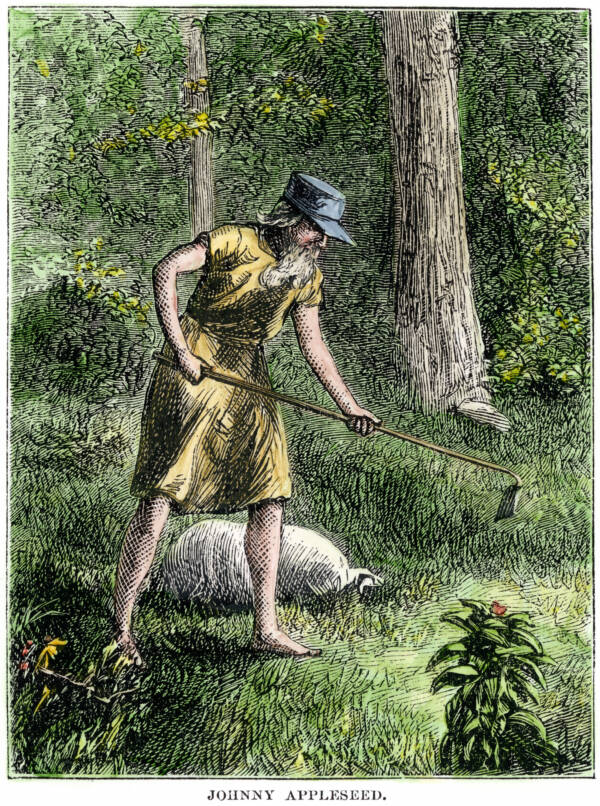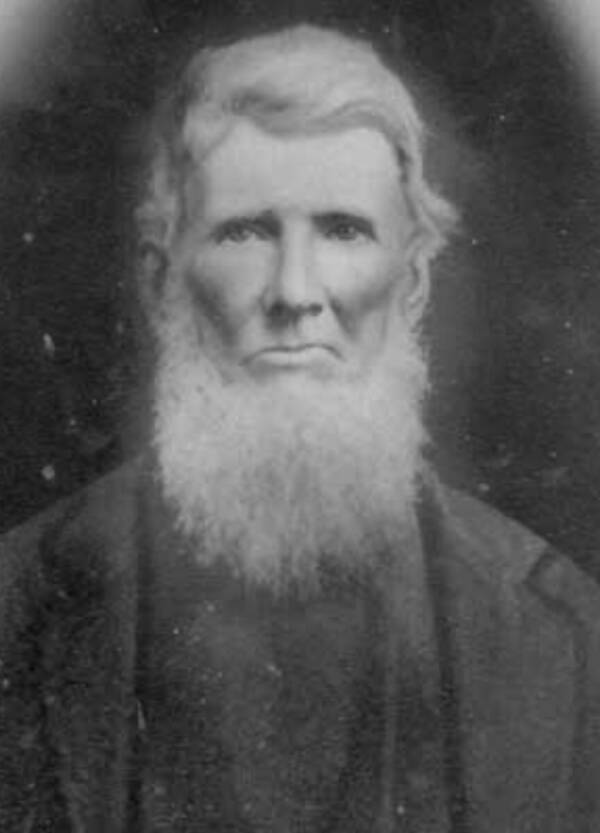A legend in the United States, Johnny Appleseed was a frontiersman and nurseryman famous for planting countless apple trees across the American Midwest.

Pictures Now / Alamy Stock Photo Johnny Appleseed is known for planting apples across the American frontier.
At the dawn of the 19th-century, apple orchards started to appear across the American frontier. And they were largely thanks to one man: John Chapman, better known as Johnny Appleseed.
An American folk hero immortalized by Disney’s 1948 Melody Time, Appleseed was an eccentric who wandered from place to place with his bag of apple seeds. Dressed in rags — and, in some accounts, a tin hat — Appleseed was well-liked among American pioneers.
But Johnny Appleseed was also a shrewd businessman. He wasn’t planting apples merely out of a love for nature. And fans of Appleseed’s Disney portrayal may be surprised to hear what his apples were likely used for.
How John Chapman Became Johnny Appleseed
Johnny Appleseed was born as John Chapman on Sept. 26, 1774, in Leominster, Massachusetts. Though not much is known about Appleseed’s early life, he had something of a tumultuous childhood. His mother died when he was two years old during childbirth. And Appleseed’s father remarried a woman with whom he’d eventually have 10 children.
As Appleseed came of age, so did his country. Appleseed’s father fought in the the Continental Army under General George Washington during the Revolutionary War, and Appleseed grew up as the nation rapidly expanded westward. Companies offered incentives for pioneers to move west, and the Louisiana Purchase in 1803 doubled the size of the United States.

U.S. National Archives and Records AdministrationThe Louisiana Purchase doubled the size of the United States and opened the frontier to pioneers — and entrepreneurs like Johnny Appleseed.
As Smithsonian Magazine explains, apples often played an important role in westward expansion. The Ohio Company of Associates promised 100 acres of land to permanent settlers, who could prove that their homestead was permanent by planting 50 apple trees and 20 peach trees in three years.
After a period of nomadic wandering with his younger half-brother, Johnny Appleseed came up with a scheme to plant apples across the western frontier. He would cultivate the orchards, then sell them to new settlers.
Along the way, Appleseed started to develop an eccentric reputation.
Bringing Apples To The New Frontier
At the turn of the century, Johnny Appleseed set out in a makeshift catamaran made of two canoes. He traveled by river across the frontier, making his way through Ohio, Pennsylvania, and even as far as Indiana. Despite the bears and wolves that populated the wilderness, Appleseed traveled light. He carried tools and a leather bag stuffed with apple seeds.

North Wind Picture Archives / Alamy Stock PhotoJohnny Appleseed planting his apples in the Ohio wilderness.
Appleseed planted the seeds, collected from cider mills, as he journeyed across the frontier. Though legend suggests that Appleseed merely flung the seeds across the land, he was careful about where he planted his apples. He would fence in the area with fallen trees and logs, return periodically to tend to the saplings, and eventually sell the land to pioneers.
These apples were likely not eaten, but used to make hard apple cider. Smithsonian Magazine reports that hard apple cider was the “beverage-of-choice” among pioneers, some of whom drank 10.52 ounces of cider a day.
Before long, the “apple seed man” started to develop a reputation among the settlers he met. The Washington Apple Commission reports that Appleseed sometimes wore nothing but a coffee sack with arm holes and rarely wore shoes. Some accounts even claim that he wore a mush pot as a hat (though this is unlikely — it would have been a heavy hat).
Johnny Appleseed would have struck pioneers as odd for other reason as well. Though highly religious and often seen with his favorite book, the Bible, Appleseed adhered to the little-known Swedenborgian Church. NPR reports that its founder, scientist and philosopher Emanuel Swedenborg, believed that angels were passing him secret Biblical messages from God.
Appleseed often carried bits and pieces of Swedenborg’s teachings in his hat, which he would give to settlers who he encountered along his travels.
He also abhorred violence — including toward animals and insects — and never married. Biography reports that Johnny Appleseed was happily abstinent and believed that he’d be rewarded in heaven. He spent his days wandering the American frontier, planting apples.
The Death Of Johnny Appleseed And His Legacy As An American Folk Hero
According to legend, Johnny Appleseed had only been sick once in his life — on his deathbed. NPR reports that he appeared at the cabin of William Worth, a friend, in mid-March 1845 and asked to stay. Worth welcomed him in, and gave him bread and milk which Appleseed ate on the floor.
Though the 70-year-old had walked 15 miles that day, he regaled his hosts with news he’d picked up during his travels and stories from his Bible. But by morning, Appleseed had developed a burning fever. He died a few days later, likely on March 18, from “winter plague.”

Public DomainThis photograph is allegedly of John Chapman, a.k.a. Johnny Appleseed.
By then, Johnny Appleseed had become something of a folk hero. A local newspaper mourned his passing, eulogizing him as an eccentric nurseryman and a follower of Swedenborg. “He is supposed to have considerable property, yet denied himself almost the common necessities of life,” the paper noted, and, indeed, Appleseed had come to own 1,200 acres of land.
Despite this, most of Appleseed’s apples are gone today. Prohibition brought federal agents to Appleseed’s orchards, who destroyed the trees with axes lest they be used for hard apple cider. But while Appleseed’s apple trees may largely be a thing of the past, his legacy certainly is not.
Disney immortalized him as friendly apple planter in Melody Time (1948), although their version makes no mention of the fact that Johnny Appleseed’s apples were used to make hard cider. He’s also been remembered through nursery rhymes, which often emphasize his kindness and charity.
“Here comes Johnny Appleseed,” one starts. “Apple seeds are all he needs. Planting orchards on his way out West. Wears a pot upon his head. Beneath the trees he makes his bed. Folks say Johnny’s apples are the best!”
After reading about Johnny Appleseed, dive into the story of seven astonishing American folk heroes that history largely forgets. Then, read the story of folk hero Davy Crockett, the “King of the Wild Frontier.”





